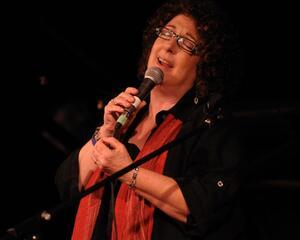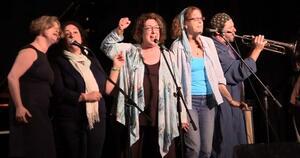Remembering Adrienne Cooper, mother of the Klezmer/Yiddish revival
Adrienne Cooper passed away on Sunday evening at the age of 65 after a long fight with cancer. Famous primarily for her extraordinary voice and ability to make Yiddish song clear to all, regardless of whether or not the listener understood the language, Cooper was, in many ways, the mother of the Klezmer/Yiddish revival of the 1980s. Her vision of "revival" was based in her own strong commitment to social justice and lay not in nostalgia for Anatevka but in the idea of Yiddish as a language in which one fights for social justice.
It is fitting that just last year she was honored by Jews for Racial & Economic Justice with its Marshall T. Meyer Risk-Taker Award. And equally fitting that Sunday saw the opening of the 27th Annual KlezKamp, an annual week of Yiddish Culture immersion that she co-founded with Henry Sapoznik.
I have thought of both threads as I reflect on the avant garde art song in which she and her partner, the brilliant pianist Marilyn Lerner, made the Yiddish poetry of Anna Margolin accessible to those of us who are Yiddish-disabled. Just a few years earlier, as the Bush administration pushed for war in Iraq, Adrienne and Marilyn gathered English, Spanish, Yiddish, and Hebrew songs for peace and tried to stop a war that has only now (at least on paper) ended.
Of all her projects, however, the one that was perhaps most exciting was an all-women’s ensemble from the late 1990s. Mikveh was one of the first revival groups that went beyond presenting music and poems that might have been played 100 years ago. Among the groups' carefully chosen repertoire were a raucous celebration of "Bas Mitzvah" and new Yiddish poems written by her daughter, Sarah Mina Gordon, including what was probably the first song grappling with abortion. Watching her glow while singing with Mikveh is how I remember Adrienne most vividly. She re-set wonderful old songs so that one walked out of the concerts not only entertained but energized and ready to fight for change in the world.
In the 15 years that I knew her, I was privileged to see her in many of her roles--from performer to KlezKamp teacher, from singer to administrator and planner—for many of those years, at Workmen's Circle, where she pioneered groundbreaking programs, reinvigorating the organization and exciting a new generation with the possibilities of Yiddish, song, and social justice. I also treasure the times we got to just sit and talk (or more often, stand and talk). In my role at the Jewish Women's Archive, I had the opportunity to work with her on projects beyond music—getting her to write a "We Remember" piece for Yiddish theatre icon Mina Bern; or in our last conversation, just last month, planning ways to gather oral histories for a new Workmen's Circle project.
Last year she released a new recording, Enchanted, which pulled many of the threads of her life together. There were songs from her production, with Jenny Romaine, of "The Memoir of Glikl of Hameln;" songs from the Peace show; and from Esn, a program about that most Jewish of subjects, food. There were old Yiddish poets set to new music, and new Yiddish poets, including her daughter. The centerpiece incorporated the sounds from a wax cylinder, lovingly digitized, that had captured her grandfather, the cantor, singing, while a baby Adrienne Cooper laughed and played in the background.
To listen to the adult Adrienne Cooper sing, accompanied by her grandfather and herself as a child, illuminates the accomplishment of her life—to create bridges to a culture that had been thought lost. She leaves us with a present touched by grace, and having known her, a future that includes hope. But her passing, like the passing of too many other "mothers" this year: Debbie Friedman, Esther Bronner, Paula Hyman, leaves us also diminished.
See Also:
- Adrienne Cooper's website
- Video of Adrienne Cooper interviewed at KlezKamp 2010 (from the National Yiddish Book Center series)
- Joseph Berger, in the NY Times: Adrienne Cooper, Yiddish Singer, Dies at 65
- Judith Pinnolis bio: Adrienne Cooper: A Yiddish Light Goes Out
- Jeffrey Shandler, in the Forward: Adrienne Cooper Embodied Progressive Spirit
- Zalmen Mlotek, frequent collaborator: Remembering Adrienne Cooper
- George Robinson, JewishWeek: Adrienne Cooper, Mother of Yiddish Revival Movement
- Debra Cash, ArtsFuse: Remembering Adrienne Cooper
- JWA: We Remember: Adrienne Cooper
- Jon Kalish, WNYC podcast: Beloved Yiddish Singer Adrienne Cooper Mourned by Colleagues
- Jon Kalish, in the Forward podcast: Adrienne Cooper's Musical Life (excerpts from Memorial Service, 1/1/12)
- The Three Yiddish Divas mourn the passing of Adrienne Cooper, z"l, by Joanne Borts
- Adrienne Cooper performs "A meydl in di yorn", KlezKamp, 1989, YIVOSounds podcast, uploaded by Lorin Sklamberg








В 1999 году я впервые приеала на Клезфест в Санкт-Петербурге и увидела, услышала и почувствовала энергию Адрианны. Мы мало знали тогда в бывшем СССР про песни на идиш. Наше понимание Идишкайта было практически равно нулю. Но встретив Адрианну, я оценила глубину, духовность, музыкальность, силу этой культуры и приняла решение всей последующей жизни (по крайней мере до сегодняшнего дня!) стать носителем и творцом песни на идиш. Привлекательная сила Адрианны как Настоящего Человека была потрясающей, я не могла устоять.
Мы виделись из года в год, сначала как учитель и ученик, а потом как коллеги. Стали обмениваться материалом, брать друг у друга репертуар, обмениваться книгами по профессиональным темам и потом просто о жизни...
Адриана очень тепло отнесласть к моему первому проекту "Вокальный квартет Ашкеназим" и не только написала статью о нас, но и организовала совместно с Залменом Млотеком для нас концерт в Arbeter Ring, заказала нам гостиницу, приняла нас, четверых сумасшедших "русских", у себя дома и... я так чувствую, просто любила нас. Вот короткий фрагмент из её статьи о нас: "As a Yiddish singer myself, and a teacher of singers, these four are a gift to me as well - first students, then, grown into colleagues that I never dreamed I would discover, half a world away, and as close as my own thoughts, my own breath. I remember hearing Polina for the first time, a number of years ago, in St. Petersburg, where I had gone to teach musicians from the former Soviet Union - and I can still conjure the shock of recognition. This is what Yiddishland sounded like - what I imagine it sounded like... "
Она плакала, когда слышала новую песню на текст её любимого стихотворения Fun Yener Zayt Lid. Она давала тончайшие советы и слышала каждую извилину наших музыкальных мозгов телепатически... И недавно она польстила меня записью моей песни на своём диске... исполнив её ну совсем по-своему!
Чем я могу ответить теперь?
Мы продолжали видеться в городах и странах: Питер, Евпатория, Киев, Москва, KlezKamp, Ashkenaz... Самое важное общение случалось за сценой. Мы обсуждали отношение заказчиков и работодателей в музыкальной индустрии, мы говорили про еврейство и ментальность таковых в разных странах, она немножко пыталась говорить по-русски и вдохновляла нас на идиш, мы деконструировали культуры и мыслительные процссы, мы боролись за права музыкантов и вместе обожали интересную еду, фильмы, книги, анекдоты... Каким потрясающим, прекрасным и великодушным человеком она была!!!!!
Адрианна была огромной частью моей жизни. Кажется, просто была важной частью меня, потому что я пока не могу заполнить пустоту.
Но вот ещё что. Я получила известие о её смерти, будучи одним из презентеров на еврейской конференции. 2000 человек евреев... Двое из них поняли, о ком я говорю. Больше никто не знал. Меня поразило не это. Меня просто подкосило не просто прохладное отношение к идишу, идишкайту и всему, что Адрианна открыла для меня и сотен других. Эти евреи не только не выражали интереса, но и просто невежетвенно и негативно отзывались об идшкайте. Культура смерти? Ничего не имеющая общего с еврейским звучанием? Чего только я не наслушалась за эти дни. Я попросила организаыию включить строчку про Адрианну в ежедневный листок с обновлениями программы семинара. Отказали. Мой идишский хор не был включен в программу гала-концерта. Среди выступающих в течение 5-ти дней были певцы на ладино, госпел-бэнд, разнообразные англоязычные барды, израильские классические и поп-музыканты, кабаре на смеси языком... НИЧЕГО от идишкайта!!!
Могу ли я плыть против течения и продолжать убеждать народ, что эта культура достойна любви, уважения и интереса? Могу ли я дальше делать то, чему Адрианна посвятила всё свою жизнь? I can't call it revival anymore, it is just survival.
Огромный поклон моим российским, украинским, молдовским, эстонским, латвийским, татарстанским и другим коллегам-клезфестовцам. Они продолжают наше "возрождение". Могу ли я сделать что-то тут в Великобритании? Буду думать.
Мира и спокойствия душе твоей, милый мой близкий человек, дорогая Адрианна, Спасибо тебе.
I had the privilege of taking Adrienne Cooper's classes and seeing her perform for many years. Her interpretations of Yiddish song were so rich and inspiring. She was an incredibly important figure, mentoring generations of musicians around the world. She will be deeply missed. Koved ir ondenk - honor her memory.